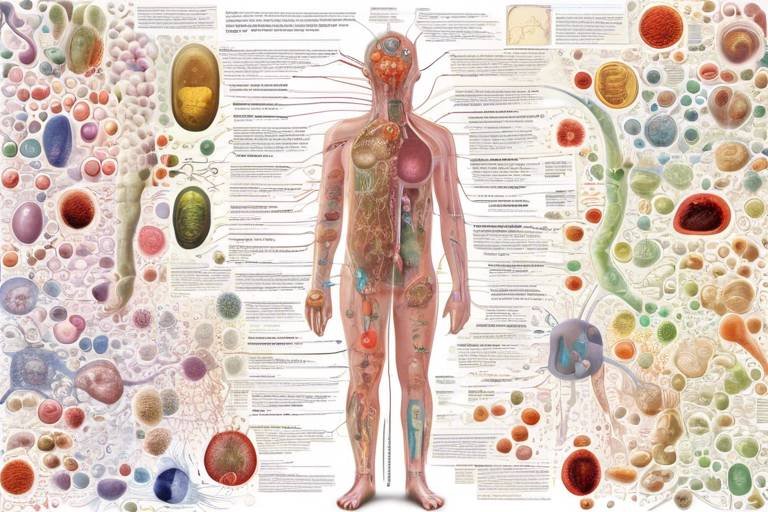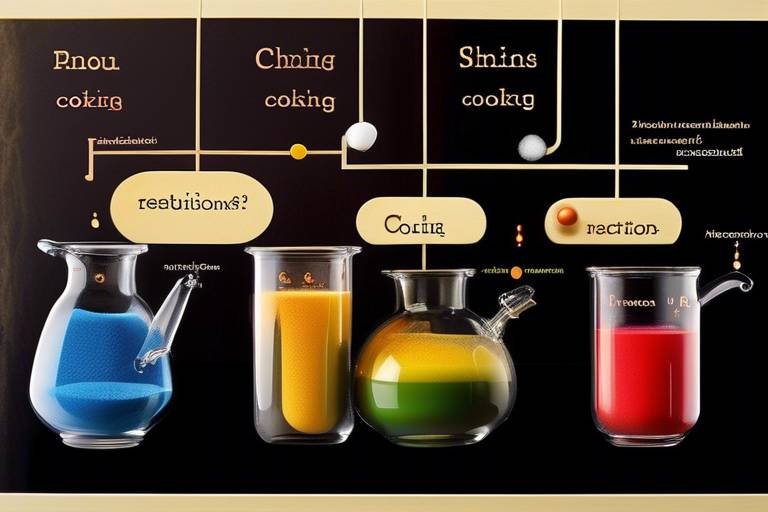The Biology of Nutrition Myths - What’s True?
In the world of nutrition, there's a vast ocean of information, but unfortunately, not all of it is based on solid science. From the latest fad diets to age-old beliefs about food, myths about nutrition are as common as they are misleading. It's crucial to sift through these misconceptions to understand what really contributes to a healthy lifestyle. So, what’s the truth behind these nutrition myths? Let's dive deep into the biology of nutrition and separate fact from fiction.
Nutrition myths often stem from a combination of historical influences, cultural beliefs, and the ever-evolving landscape of dietary advice. For instance, many of us grew up hearing that eating fat makes you fat, or that carbs are the enemy. These ideas didn't just pop up overnight; they are often rooted in outdated science or taken out of context. Understanding the origins of these myths is essential in debunking them and moving towards a more evidence-based approach to nutrition.
Moreover, the role of misinformation in shaping dietary habits cannot be overstated. With the rise of social media and the internet, anyone can share their thoughts on nutrition, regardless of their expertise. This has led to a confusing mix of advice, where personal anecdotes often overshadow scientific research. It's like trying to navigate a maze blindfolded; you might stumble upon some truths, but you'll likely hit a wall of misinformation along the way. That's why it's vital to approach nutrition with a critical eye and an open mind.
As we explore common nutrition myths, we will provide evidence-based insights that clarify misconceptions about food, diets, and health benefits. By understanding the science behind nutrition, we can make informed choices that truly benefit our health.
Understanding where nutrition myths originate helps debunk them. Many myths have historical roots, often influenced by cultural beliefs or the limited scientific knowledge of the time. For example, the belief that eating eggs raises cholesterol levels comes from early studies that didn't account for individual variability in cholesterol metabolism. Over the years, as research has advanced, we've learned that dietary cholesterol has a minimal impact on blood cholesterol for most people. This is just one example of how historical context can skew our understanding of nutrition.
Additionally, cultural beliefs play a significant role in shaping our dietary habits. In some cultures, specific foods are viewed as superfoods, while in others, they are considered unhealthy. This can lead to a patchwork of dietary advice that varies widely from one region to another. Unfortunately, this diversity can sometimes perpetuate myths that lack scientific backing, leaving many people confused about what to eat.
Finally, the role of misinformation in nutrition cannot be ignored. The internet is rife with blogs, articles, and videos that claim to have the secret to perfect health. However, without a solid foundation in scientific research, these claims can be misleading. It's essential to approach nutrition advice with a discerning eye, questioning the source and the evidence behind the claims.
Now, let's address some of the most widespread nutrition myths that have taken hold in popular culture. It's time to set the record straight and provide you with the facts.
One of the most persistent myths is that carbohydrates are the enemy. Many believe that consuming carbs leads to weight gain and poor health. However, this couldn't be further from the truth! Carbohydrates are a crucial part of a balanced diet, providing the body with the energy it needs to function optimally. Think of carbs as the fuel for your body's engine—without them, you're likely to stall.
It's important to differentiate between complex and simple carbohydrates. Complex carbs, found in foods like whole grains, legumes, and vegetables, are packed with nutrients and fiber, which help regulate blood sugar levels and keep you feeling full. On the other hand, simple carbohydrates, often found in sugary snacks and beverages, can lead to spikes in blood sugar and energy crashes. So, while not all carbs are created equal, dismissing them entirely is a mistake.
The glycemic index (GI) is a tool that helps evaluate carbohydrate quality. It ranks foods based on how quickly they raise blood sugar levels. Foods with a high GI can cause rapid spikes in blood sugar, while those with a low GI provide a more gradual energy release. Understanding the GI can help you make smarter choices about the carbs you consume, ensuring you're fueling your body effectively.
Fats often receive a bad reputation, but not all fats are created equal. In fact, some fats are essential for good health! Healthy fats, such as those found in avocados, nuts, and olive oil, play a vital role in hormone production, brain function, and nutrient absorption. It's time to stop fearing fat and start embracing the right kinds!
Supplements are often touted as necessary for health, but do we really need them? This section examines their effectiveness, potential benefits, and when they might be needed.
While vitamin supplements can be beneficial for some individuals, they should not replace whole foods. Whole foods provide a complex array of nutrients that work synergistically to promote health. For example, an orange is not just a source of vitamin C; it also contains fiber, antioxidants, and other beneficial compounds that contribute to overall well-being. So, whenever possible, opt for whole foods over supplements to get the most out of your nutrition.
The necessity of multivitamins is frequently debated. While they can be helpful for certain populations, such as pregnant women or those with specific deficiencies, most people can obtain the nutrients they need through a balanced diet. Relying too heavily on supplements can lead to a false sense of security about one's nutrition, potentially resulting in poor dietary choices. Always consult with a healthcare professional before starting any supplement regimen.
- Are carbs really bad for you? No, carbohydrates are essential for energy. Focus on whole, complex carbs for optimal health.
- Do I need to take vitamins if I eat a balanced diet? Most people can get sufficient nutrients from food, but some may benefit from supplements.
- Is all fat bad for you? No, healthy fats are crucial for your body. Include sources like avocados and nuts in your diet.

The Origins of Nutrition Myths
Understanding the origins of nutrition myths is like peeling an onion; each layer reveals more about how our beliefs about food have been shaped over time. Many of these myths stem from historical influences, cultural beliefs, and the often chaotic landscape of misinformation that surrounds dietary advice. For instance, in ancient times, food was often attributed mystical properties. Certain foods were deemed "good" or "bad" based on folklore rather than science, leading to the **misconceptions** we still see today.
One significant factor in the development of nutrition myths is the role of **media and advertising**. In the 20th century, as processed foods became more prevalent, marketing campaigns began to promote these items as healthier alternatives to whole foods. This shift has led to widespread beliefs about what constitutes a healthy diet, often ignoring the nutritional value of natural foods. For example, the demonization of fats in the 1980s, spurred by sensationalized reports linking them to heart disease, created a lasting stigma that still influences our eating habits today.
Moreover, cultural beliefs play a pivotal role in shaping our dietary practices. Different cultures have unique food traditions that can either support or contradict scientific evidence. For instance, the Mediterranean diet, rich in healthy fats and whole grains, is often praised for its health benefits, yet some cultures still cling to outdated notions that all fats are harmful. This disconnect between tradition and science can perpetuate myths that hinder our understanding of nutrition.
Additionally, the internet has become a double-edged sword in the realm of nutrition. While it provides access to a wealth of information, it also serves as a breeding ground for misinformation. Social media influencers and self-proclaimed nutrition experts often promote fad diets and unverified claims that can mislead the public. Did you know? A study found that nearly 90% of health-related posts on social media lack scientific backing, yet they can easily sway public opinion and reinforce existing myths.
In conclusion, the origins of nutrition myths are deeply rooted in a blend of historical context, cultural beliefs, and the pervasive influence of media. By understanding these origins, we can better navigate the often confusing world of dietary advice and make informed choices about our nutrition. It is essential to approach food with a critical mind, recognizing that not everything we hear is true. Instead, let’s focus on evidence-based information that promotes a balanced and healthy lifestyle.
- What are some common nutrition myths? Many people believe that carbs are bad, all fats are harmful, and that supplements can replace whole foods.
- How do cultural beliefs influence nutrition? Cultural beliefs can shape dietary practices, leading to misconceptions about what foods are healthy or unhealthy.
- Why is misinformation about nutrition so prevalent? The rise of social media and the internet has made it easier for myths to spread, often without scientific backing.

Common Nutrition Myths Debunked
When it comes to nutrition, there’s a lot of noise out there. It seems like every other day, a new diet fad pops up, promising miraculous results, while old beliefs get tossed aside. But what’s the real story? In this section, we’re diving deep into some of the most common nutrition myths that have been floating around for years. By examining the science behind these claims, we can separate fact from fiction and help you make informed dietary choices.
Ah, the infamous carbs! Many people have been led to believe that carbohydrates are the enemy, contributing to weight gain and health issues. However, this is a classic case of misinformation. Carbs are actually a vital part of a balanced diet. They are our body's primary source of energy, fueling everything from our daily activities to our workouts. So, instead of fearing carbs, we should be focusing on the quality of the carbohydrates we consume.
Understanding the difference between complex and simple carbohydrates is crucial in navigating your diet. Complex carbohydrates, found in foods like whole grains, legumes, and vegetables, are digested slowly, providing a steady release of energy and keeping you fuller for longer. On the other hand, simple carbohydrates, which are present in sugary snacks and drinks, can lead to quick spikes in blood sugar followed by crashes, leaving you feeling tired and hungry.
| Type of Carbohydrate | Examples | Health Benefits |
|---|---|---|
| Complex Carbohydrates | Whole grains, beans, vegetables | Steady energy, high in fiber |
| Simple Carbohydrates | Sugary drinks, candies, pastries | Quick energy, but can lead to crashes |
The glycemic index (GI) is a tool that helps evaluate the quality of carbohydrates in terms of how they affect blood sugar levels. Foods with a high GI can spike your blood sugar quickly, while low-GI foods provide a more gradual energy release. Incorporating more low-GI foods into your diet can help maintain steady energy levels and reduce the risk of chronic diseases. So, next time you grab a snack, consider checking its GI!
Fats have long been demonized in the world of nutrition, but it’s time to set the record straight. Not all fats are created equal! While it’s true that trans fats and excessive saturated fats can pose health risks, healthy fats play a crucial role in our body. They support cell growth, protect our organs, and aid in nutrient absorption. So, instead of cutting out fats entirely, we should be choosing the right types.
- Healthy Fats: Found in avocados, nuts, seeds, and olive oil, these fats are beneficial for heart health.
- Unhealthy Fats: Found in processed foods and fried items, these should be limited in your diet.
Incorporating healthy fats into your meals can enhance flavor and even help you feel satisfied longer. Think of fats as the “glue” that holds your meals together, making them not just nutritious but also delicious!
Q: Are carbs really that bad for me?
A: Not at all! Carbs are essential for energy. Focus on the type of carbs you eat—opt for whole grains and vegetables over sugary snacks.
Q: What are the best sources of healthy fats?
A: Healthy fats can be found in foods like avocados, nuts, seeds, and fatty fish. Incorporate these into your diet for optimal health.
Q: Should I take supplements if I eat a balanced diet?
A: Generally, whole foods provide the best nutrients. However, some individuals may benefit from supplements, especially if they have specific dietary restrictions or health concerns.

Myth: Carbs Are Bad
When it comes to nutrition, one of the most pervasive myths is that carbohydrates are the enemy. This misconception has led many to believe that cutting carbs entirely will result in weight loss and improved health. However, this couldn't be further from the truth! Carbohydrates are actually a vital source of energy for our bodies, playing a crucial role in everything from brain function to physical activity. Imagine trying to run a marathon without fuel—your body would quickly run out of steam! That's exactly what happens when you deprive yourself of carbs.
To truly understand the role of carbohydrates in our diets, we need to differentiate between the types of carbs we consume. There are simple carbohydrates and complex carbohydrates, each serving different purposes in our nutrition. Simple carbohydrates, found in sugary snacks and beverages, can lead to quick spikes in blood sugar. In contrast, complex carbohydrates, like whole grains, legumes, and vegetables, provide sustained energy and are packed with essential nutrients. Think of complex carbs as the tortoise in the classic fable—the slow and steady source of energy that keeps you going throughout the day.
Understanding the difference between complex and simple carbohydrates is essential for making informed dietary choices. Here’s a quick breakdown:
| Type of Carbohydrate | Examples | Health Benefits |
|---|---|---|
| Simple Carbohydrates | Candy, soda, white bread | Quick energy boost, but can lead to crashes |
| Complex Carbohydrates | Oats, quinoa, brown rice, fruits, vegetables | Sustained energy, fiber-rich, essential nutrients |
Moreover, the glycemic index (GI) is a valuable tool for evaluating carbohydrate quality. The GI measures how quickly a carbohydrate-containing food raises blood glucose levels. Foods with a high GI can cause rapid spikes in blood sugar, while low-GI foods provide a more gradual increase, stabilizing energy levels. Incorporating low-GI foods into your meals can help maintain energy and curb cravings, making it easier to stick to a healthy eating plan.
Understanding the glycemic index can be a game-changer in how we view carbohydrates. Foods that rank low on the GI scale include:
- Legumes (beans, lentils)
- Whole grains (barley, whole wheat bread)
- Non-starchy vegetables (broccoli, spinach)
- Most fruits (berries, apples)
These foods not only provide energy but also come loaded with fiber, vitamins, and minerals that contribute to overall health. So, the next time someone tells you that carbs are bad, remember that it’s all about choosing the right types of carbohydrates and understanding their impact on your body.
In conclusion, carbs are not the villain they’re often made out to be. Instead, they are a crucial part of a balanced diet, providing energy and essential nutrients that support overall health. So, let’s put the myth to rest and embrace the power of carbohydrates in our daily meals!

Complex vs. Simple Carbohydrates
When it comes to understanding carbohydrates, it’s essential to differentiate between complex and simple carbohydrates. These two categories play distinct roles in our diets, and knowing the difference can help you make better food choices. Simple carbohydrates, often referred to as sugars, are the most basic form of carbohydrates. They consist of one or two sugar molecules and are quickly absorbed by the body, leading to rapid spikes in blood sugar. Think of them as the quick bursts of energy you get from candy or soda. They may provide a quick energy boost, but that energy fades just as quickly, often leaving you feeling drained and craving more. Examples of simple carbohydrates include:
- Table sugar
- Honey
- Fruit juices
- White bread
On the other hand, complex carbohydrates are made up of longer chains of sugar molecules, which means they take longer to digest. This slow breakdown leads to a gradual release of energy, keeping you fuller for longer and helping to stabilize blood sugar levels. Foods rich in complex carbohydrates include whole grains, legumes, and vegetables. They are often packed with essential nutrients and fiber, making them a healthier choice overall. Consider complex carbohydrates as the slow-burning fuel for your body, akin to a well-tended fire that provides consistent warmth over time. Some examples of complex carbohydrates are:
- Brown rice
- Quinoa
- Oats
- Sweet potatoes
Understanding the difference between these two types of carbohydrates is crucial for maintaining a balanced diet. While simple carbohydrates can be enjoyed in moderation, relying on them too heavily can lead to energy crashes and unhealthy eating patterns. In contrast, incorporating complex carbohydrates into your meals can provide sustained energy, promote digestive health, and support overall well-being.
In summary, while both types of carbohydrates serve a purpose, focusing on complex carbohydrates can help you achieve a more balanced, nutritious diet. Remember, it’s not just about counting carbs; it’s about choosing the right kinds that will fuel your body effectively and keep you feeling your best!
Q: Are all carbohydrates bad for you?
A: No, not all carbohydrates are bad. It's important to focus on the quality of carbohydrates rather than simply avoiding them. Complex carbohydrates, like whole grains and vegetables, are beneficial for your health.
Q: How can I incorporate more complex carbohydrates into my diet?
A: You can include more complex carbohydrates by choosing whole grain options, adding legumes to your meals, and increasing your intake of fruits and vegetables.
Q: Should I eliminate simple carbohydrates completely?
A: It's not necessary to eliminate simple carbohydrates entirely. Enjoy them in moderation, especially in the form of fruits and dairy, which provide essential nutrients along with sugars.

The Glycemic Index Explained
The glycemic index (GI) is a crucial concept in understanding how different carbohydrates affect our blood sugar levels. It ranks foods on a scale from 0 to 100 based on how quickly they raise blood glucose levels after consumption. Foods with a high GI, such as white bread and sugary snacks, can cause rapid spikes in blood sugar, which may lead to energy crashes and increased hunger shortly after eating. On the other hand, low-GI foods, like whole grains, legumes, and most fruits and vegetables, release glucose more slowly and steadily, providing a more sustainable energy source.
But why does this matter? Well, managing blood sugar levels is essential for overall health, especially for individuals with diabetes or those looking to maintain a healthy weight. By understanding the glycemic index, you can make more informed choices about the carbohydrates you include in your diet. For instance, swapping out high-GI foods for low-GI alternatives can help stabilize your energy levels throughout the day and reduce cravings.
To illustrate the differences, here's a simple table comparing some common foods and their glycemic index values:
| Food | Glycemic Index |
|---|---|
| White Bread | 70 |
| Brown Rice | 50 |
| Apple | 38 |
| Chickpeas | 28 |
As you can see, the glycemic index of these foods varies significantly. This means that choosing foods with a lower GI can be beneficial for maintaining balanced blood sugar levels. It’s like choosing a marathon over a sprint; the steady pace of low-GI foods keeps you going longer without the abrupt highs and lows that come with high-GI options.
However, it's important to remember that the glycemic index is just one piece of the puzzle. The overall nutritional value of food, portion sizes, and how food is prepared also play significant roles in its health impact. For example, a chocolate bar has a high GI, but it also contains a lot of sugar and fat, making it less desirable than a low-GI food that is nutrient-dense.
In conclusion, understanding the glycemic index can empower you to make better food choices. By opting for low-GI foods, you can help regulate your blood sugar levels, enhance your energy levels, and support your overall health. So next time you’re at the grocery store, consider checking the glycemic index of the foods you’re buying. It might just change the way you think about carbohydrates!
- What is the glycemic index? The glycemic index is a scale that ranks foods based on how quickly they raise blood sugar levels.
- Are low-GI foods always healthier? While low-GI foods are generally better for blood sugar control, overall nutrition and portion sizes are also important.
- Can I eat high-GI foods? Yes, but it's best to consume them in moderation and balance them with low-GI foods.

Myth: All Fats Are Harmful
When it comes to nutrition, the word "fat" often sends shivers down the spine of many health-conscious individuals. It's almost as if the mere mention of fat conjures up images of greasy burgers and unhealthy snacks. But here’s the kicker: not all fats are created equal, and in fact, some fats are essential for your health! Can you believe that? It’s time to bust this myth wide open and embrace the truth about fats.
First off, let’s clarify what we mean by "fats." Fats are a type of macronutrient, just like carbohydrates and proteins. They play a crucial role in our bodies by providing energy, supporting cell growth, protecting our organs, and helping our bodies absorb nutrients. Yes, you heard that right! Fats are not just the enemy; they are vital for our overall well-being.
Now, you might be wondering, “If fats are so important, why do we hear so much about avoiding them?” The answer lies in the distinction between different types of fats. There are healthy fats and unhealthy fats, and understanding the difference is key. Healthy fats, such as those found in avocados, nuts, seeds, and olive oil, can actually help reduce bad cholesterol levels and provide essential fatty acids that our bodies cannot produce on their own.
On the flip side, unhealthy fats, like trans fats and excessive saturated fats, can indeed contribute to health issues such as heart disease. It’s similar to the difference between a well-cooked steak and a charred piece of meat; one can be nutritious and satisfying, while the other could lead to health problems if consumed in excess. So, how do we navigate this complex world of fats?
Here’s a quick breakdown of the types of fats:
- Monounsaturated Fats: Found in olive oil, avocados, and nuts, these fats are known to improve heart health.
- Polyunsaturated Fats: These include omega-3 and omega-6 fatty acids, which are essential for brain function and cell growth, found in fish and flaxseeds.
- Saturated Fats: Found in animal products and some plant oils, they should be consumed in moderation.
- Trans Fats: Often found in processed foods, these should be avoided as they can raise bad cholesterol levels.
Incorporating healthy fats into your diet can actually help you feel fuller for longer, which can be beneficial if you’re trying to manage your weight. Imagine you’re on a long road trip; would you rather fill up on a quick snack that leaves you hungry again in an hour, or a hearty meal that keeps you satisfied for the journey ahead? Healthy fats serve that purpose in your meals, providing lasting energy and satisfaction.
In conclusion, the myth that all fats are harmful is not only misleading but can also prevent you from enjoying a balanced and nutritious diet. Embracing healthy fats can lead to improved health outcomes, better energy levels, and a greater sense of satisfaction with your meals. So, the next time you hear someone say, “I’m cutting out all fats,” you can confidently share the truth: fats are not the enemy; they’re a crucial part of a healthy lifestyle!

The Role of Supplements in Nutrition
When it comes to nutrition, the conversation often veers into the realm of supplements. These little pills, powders, and potions promise to fill the gaps in our diets, boost our energy, and even enhance our overall health. But do they really deliver on these promises? Or are they just another marketing gimmick? To truly understand the role of supplements in nutrition, we need to peel back the layers and examine their effectiveness, potential benefits, and the circumstances under which they might be necessary.
First off, let’s talk about the effectiveness of supplements. While some studies suggest that certain supplements can be beneficial, such as vitamin D for those with limited sun exposure or omega-3 fatty acids for heart health, the truth is that most people can get all the nutrients they need from a well-balanced diet. Think of your body as a high-performance vehicle; it runs best on premium fuel—whole foods rich in vitamins, minerals, and antioxidants. Supplements, while helpful in some cases, should not replace a healthy diet.
Now, let’s dive into the potential benefits of supplements. For example, individuals with specific dietary restrictions, such as vegans or vegetarians, may find it challenging to obtain sufficient levels of certain nutrients like vitamin B12 or iron. In such cases, supplements can serve as a useful tool to help meet nutritional needs. Additionally, older adults often face challenges in absorbing nutrients, making supplements a viable option for maintaining their health. However, it’s crucial to remember that not all supplements are created equal. Quality matters, and it’s essential to choose reputable brands that undergo third-party testing.
So, when might supplements be necessary? Here are a few scenarios:
- Dietary Restrictions: If you follow a restrictive diet, you may be missing out on essential nutrients.
- Medical Conditions: Certain health issues can impair nutrient absorption, necessitating supplementation.
- Age Factors: As we age, our bodies may require additional nutrients to maintain health.
Despite the potential benefits, it’s important to approach supplements with caution. Over-reliance on them can lead to a false sense of security regarding one’s dietary habits. Some individuals might think, “I can skip my veggies because I take a multivitamin,” which is a dangerous mindset. Not only can excessive supplementation lead to toxicity, but it can also result in the neglect of a balanced diet. It’s like trying to fill a leaky bucket with water while ignoring the holes; no matter how much you pour in, it will never be full.
In conclusion, while supplements can play a role in improving health for certain individuals, they are not a one-size-fits-all solution. The best approach to nutrition is still to focus on a diverse and balanced diet. If you’re considering supplements, it’s wise to consult with a healthcare provider or a registered dietitian to tailor a plan that meets your specific needs. They can help you navigate the complex world of nutrition and determine whether supplements are a necessary addition to your lifestyle.
Q1: Are supplements necessary for everyone?
A1: No, most people can get all the nutrients they need from a balanced diet. However, some individuals with specific dietary restrictions or health conditions may benefit from supplements.
Q2: Can taking too many supplements be harmful?
A2: Yes, excessive supplementation can lead to toxicity and negative health effects. It’s important to follow recommended dosages and consult with a healthcare provider.
Q3: What should I look for when choosing a supplement?
A3: Choose high-quality supplements from reputable brands that undergo third-party testing to ensure safety and efficacy.

Vitamins vs. Whole Foods
When it comes to nutrition, the debate between vitamins and whole foods is like a classic showdown in the world of health. On one side, we have vitamins, those tiny powerhouses of nutrients that promise to fill in the gaps of our diets. On the other, we have whole foods, the natural, unprocessed options that have been around long before the concept of supplements even existed. So, which one should you prioritize? Let's dig deeper into this intriguing topic!
First off, let's talk about whole foods. These are foods that are as close to their natural state as possible. Think fruits, vegetables, whole grains, nuts, and seeds. They are packed with not only vitamins and minerals but also fiber, antioxidants, and a plethora of other beneficial compounds. Whole foods work synergistically to provide a complete nutritional profile that your body can easily absorb and utilize. When you eat an apple, for instance, you’re not just getting vitamin C; you’re also consuming fiber that aids digestion, phytonutrients that fight inflammation, and a host of other beneficial compounds that work together to promote health.
Now, let’s not throw vitamins under the bus completely! Vitamins can be incredibly useful, especially in situations where dietary restrictions or health conditions make it difficult to get enough nutrients from food alone. For example, individuals with certain medical conditions, pregnant women, or those following a vegan diet might find it challenging to meet their nutritional needs through whole foods alone. In these cases, a good quality vitamin supplement can act as a safety net, ensuring that you’re not missing out on essential nutrients.
However, it’s crucial to remember that not all vitamins are created equal. The body often absorbs nutrients from whole foods more effectively than from synthetic supplements. For instance, the vitamin C found in an orange is accompanied by a variety of other nutrients that enhance its absorption and effectiveness. In contrast, a vitamin C tablet may not provide the same benefits, as it lacks these synergistic components.
To illustrate the differences, let’s take a look at a simple comparison:
| Aspect | Whole Foods | Vitamins |
|---|---|---|
| Nutrient Density | High | Variable |
| Absorption | Better | Often less effective |
| Synergistic Benefits | Yes | No |
| Risk of Overconsumption | Low | High |
In conclusion, while vitamins can play a role in filling nutritional gaps, they should not be seen as a substitute for a balanced diet rich in whole foods. The best approach to nutrition is to prioritize whole foods whenever possible, using vitamins as a supplementary measure when needed. Think of it this way: whole foods are the foundation of a healthy diet, while vitamins can be the icing on the cake, adding a little extra nutrition when necessary!
1. Can I rely solely on vitamins for my nutrition?
No, relying solely on vitamins is not recommended. Whole foods provide a variety of nutrients that work together to promote health, which supplements cannot fully replicate.
2. Are all vitamin supplements safe?
Not all vitamin supplements are safe. It's important to choose high-quality products and consult with a healthcare professional before starting any supplement regimen.
3. How can I ensure I'm getting enough nutrients from whole foods?
Focus on a diverse diet that includes a variety of fruits, vegetables, whole grains, and proteins. Planning meals and being mindful of your food choices can help you meet your nutritional needs.

Are Multivitamins Necessary?
When it comes to the question of whether multivitamins are necessary, the answer isn’t as straightforward as one might hope. Many people turn to these supplements with the belief that they can fill in the nutritional gaps in their diets. But is that really the case? To unravel this mystery, we need to consider several factors, including dietary habits, lifestyle choices, and individual health needs.
First off, let's talk about whole foods. The general consensus among nutritionists is that getting your vitamins and minerals from whole foods is vastly superior to relying on supplements. Why? Whole foods contain a complex blend of nutrients that work synergistically, meaning they enhance each other's absorption and effectiveness. For example, the vitamin C in an orange not only boosts your immune system but also aids in the absorption of iron from leafy greens. This kind of interaction is something that multivitamins simply can’t replicate.
However, there are exceptions to this rule. Certain populations may indeed benefit from taking multivitamins. For instance, pregnant women often require additional folic acid to prevent neural tube defects in their babies. Similarly, older adults may find it challenging to get enough nutrients due to decreased appetite or digestive issues, making a multivitamin a practical solution. Additionally, people with specific dietary restrictions, such as vegans or vegetarians, may struggle to obtain adequate levels of certain nutrients like vitamin B12, iron, and omega-3 fatty acids.
It's also essential to consider the potential risks associated with over-reliance on supplements. While they can be beneficial, taking multivitamins without proper guidance can lead to nutrient imbalances or even toxicity. For example, excessive intake of vitamin A can lead to liver damage, while too much iron can cause gastrointestinal issues. Therefore, it’s crucial to approach supplementation with caution and ideally under the guidance of a healthcare professional.
In summary, while multivitamins can serve a purpose for specific groups, they are not a one-size-fits-all solution. The best approach to nutrition is to focus on a balanced diet rich in whole foods. If you're considering taking multivitamins, consult with a healthcare provider to assess your individual needs. They can help you determine whether a multivitamin is necessary for you and guide you on the appropriate dosage if it is.
- Can I get all my nutrients from food? Yes, a well-balanced diet can provide all the essential nutrients your body needs.
- Who should consider taking multivitamins? Pregnant women, older adults, and those with specific dietary restrictions may benefit from supplementation.
- Are there any risks associated with taking multivitamins? Yes, excessive intake can lead to nutrient imbalances and toxicity; consult a healthcare provider for guidance.
Frequently Asked Questions
- What are some common nutrition myths?
There are plenty of nutrition myths floating around, but some of the most common include the belief that carbs are bad, all fats are harmful, and that you need supplements to be healthy. These misconceptions can lead to poor dietary choices and confusion about what to eat.
- Are carbohydrates really bad for you?
No, carbohydrates are not inherently bad! In fact, they are a vital part of a balanced diet. The key is to focus on complex carbohydrates, like whole grains and vegetables, which provide essential nutrients and energy for your body.
- What’s the difference between complex and simple carbohydrates?
Complex carbohydrates, found in foods like beans and whole grains, are digested slowly and provide sustained energy. Simple carbohydrates, on the other hand, are found in sugary foods and can lead to quick spikes in blood sugar. It's all about choosing the right types!
- Are all fats unhealthy?
Absolutely not! While trans fats and excessive saturated fats can be harmful, healthy fats found in avocados, nuts, and olive oil are crucial for your body's function. They support cell growth and help absorb vitamins!
- Do I really need to take vitamin supplements?
Not necessarily! Many people can get all the vitamins and minerals they need from a well-balanced diet rich in fruits, vegetables, whole grains, and proteins. However, some individuals, like pregnant women or those with specific health conditions, might benefit from supplements.
- What should I prioritize: whole foods or supplements?
Whole foods should always be your first choice! They provide a complex array of nutrients that supplements can't fully replicate. Think of whole foods as a complete orchestra, while supplements are more like a single note.
- Are multivitamins necessary for everyone?
Not everyone needs multivitamins. While they can be beneficial for certain groups, like the elderly or those with dietary restrictions, most healthy individuals can meet their nutritional needs through a balanced diet.
- How can I separate nutrition facts from myths?
To separate fact from fiction, it's essential to rely on credible sources, such as registered dietitians, scientific studies, and reputable health organizations. Always question sensational claims and look for evidence-based information.



















